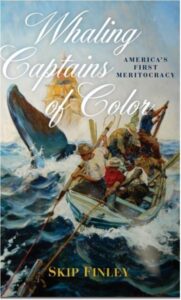Presented by Historian and Journalist Skip Finley
When: February 27, 2022 (Sunday), 2:00 pm
Where: Felton-Smith Historic Site, 38 Felton Street, Peabody, MA
Many of the historic houses that decorate Skip Finley’s native Martha’s Vineyard were originally built by whaling captains. Whether in his village of Oak Bluffs, on the Island of Nantucket where whaling burgeoned, or in New Bedford, which became the City of Light thanks to whale oil, these magnificent homes testify to the money made from whaling. In terms of oil, the triangle connecting Martha’s Vineyard to these areas and Eastern Long Island was the Middle East of its day. Whale wealth was astronomical, and endures in the form of land trusts, roads, hotels, docks, businesses, homes, churches and parks. Whaling revenues were invested into railroads and the textile industry. Millions of whales died in the 200-plus-year enterprise, with more than 2,700 ships built for chasing, killing and processing them. Whaling was the first American industry to exhibit any diversity, and the proportion of men of color people who participated was amazingly high. A man got to be captain not because he was white or well connected, but because he knew how to kill a whale. Along the way he would also learn navigation and how to read and write. Whaling presented a tantalizing alternative to mainland life. Working with archival records at whaling museums, in libraries, from private archives and studying hundreds of books and thesis, Finley culls the best stories from the lives of over 50 Whaling Captains of Color to share the story of America’s First Meritocracy.
This program is supported in part by a grant from the Peabody Cultural Council, a local agency which is supported by the Mass Cultural Council, a state agency.

